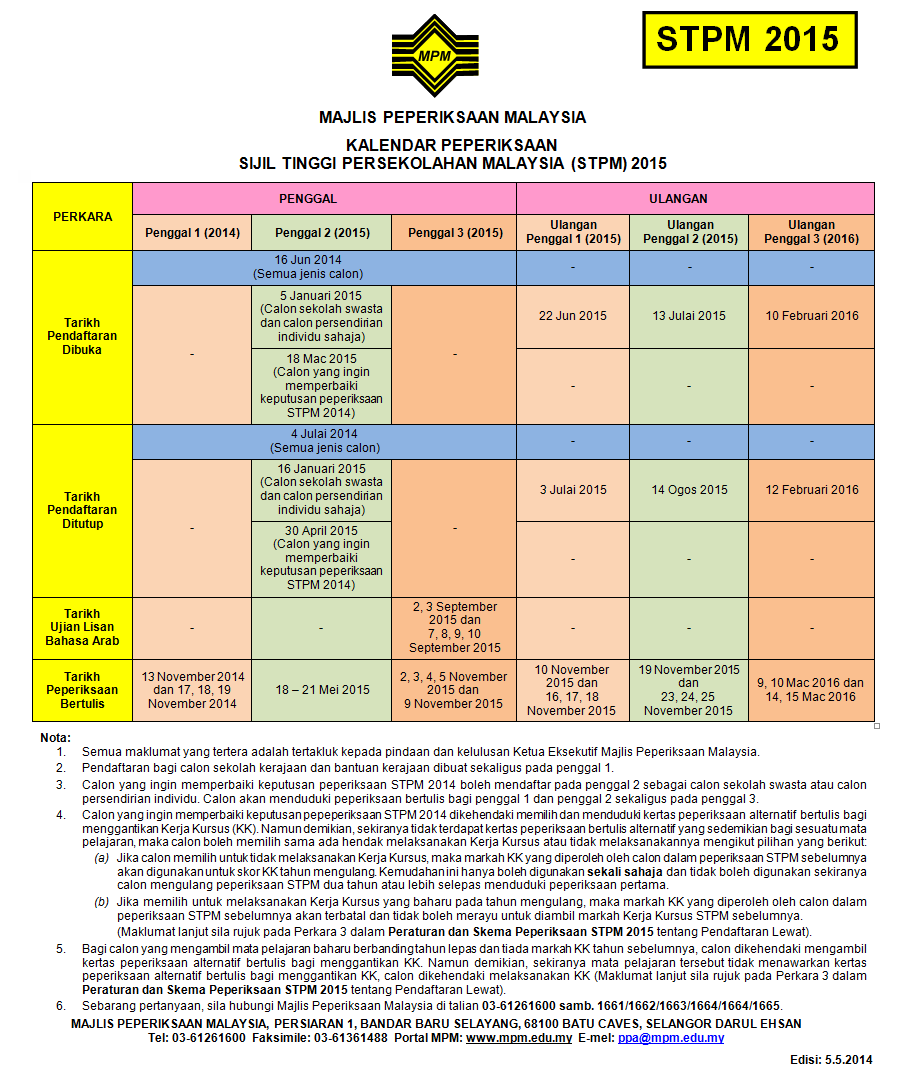Guest post by Sulwen
To keep things simple, I would like to classify the subjects in SPM according to their categories.
Languages – Bahasa Malaysia and English
Sciences – Biology, Chemistry, and Physics
Math- Modern Maths, Add Maths
General Knowledge/ Culture- History and Moral
There is no shortcut to Languages as you will be evaluated based on your skills to project your thoughts and maintain your proficiency throughout the entire essay and other various sections such as comprehension, summary and so forth. I would strongly urge each and everyone to take interest in mastering Languages as these subjects are the key skills in communication, that will lead you to getting a job and enhance the quality of your life.
To start the ball rolling, one should get some books to practice on your skills. If you are short of time to prepare for the next exam, practice harder on the skills that you are lacking. Keep doing questions on comprehension, summary, forming sentences (BM). As for comprehension and summary in both subjects, keep referring to the title/question asked. Write down the points in point form and rationalize if it relates to the title/question. After much practice, you should be able to easily spot the points in the passage. However, do not be over-confident. Remain calm and careful, screening through the text for any extra points. As for summary in English, you may use your own words to replace a single word in the passage. Be careful not to alter the meaning of the passage and keep count of the number of words written. For example, "Fifth Harmony is a popular band in America.", "Fifth Harmony is a famous band in America." You may also alter the structure of the sentence if you are good enough. As for forming sentences (bina ayat) in BM, refer to the meaning of the word in a Malay Dictionary (Kamus Dewan is preferable) and try to form your own sentence. Then, refer to the answers to get a better understanding of the word. You may also ask your school/tuition teacher if you sentence is grammatically correct.
Essays regardless in Bahasa Malaysia or English might be a tougher aspect for most students due to the common issues like getting penalized for inaccurate usage of words, incorrect spelling, lack of ideas on what to write and the inability to finish both essays in time. Start by brainstorming before writing your essay in point form. If it helps you, write down the idioms (peribahasa) or phrases that you might want to use in your essay. Don't worry if you do not have the entire essay planned out. Make a draft out of the first few ideas/plots first and start writing. As I have mentioned earlier in a comment, try to stand out and be original. This gives the examiner a good impression of your writing. Instead of common sentences like "It was a dark and frightful night", "During the holidays, I spent time with my cousins.", start with intriguing sentences like, "Being on higher ground did not make me feel safe as I tried to ignore the realization of my fear of heights.", "I was slowly slipping into unconsciousness as I saw a hand reach out towards mine, igniting my body with this unsual heating sensation." For factual essays, avoid common ones like "Recently, the crime rates has reportedly increased nationwide." or "Nowadays, students hold no regard in respecting their elders due to their lack of morality" Opt for, "The lives of local residents of Taman X are jeopardized due to the rise in crime rates that ceases to have no end." or "Respect is a two-way street whereby it is earned and not obtained through fear. However, generation Z has a different approach and mindset when it comes to respecting their elders." For BM essays, start with unique openings and good endings with a solution instead of 'Pada masa ini'.
General knowledge/culture requires a lot of extra knowledge that are not in your usual textbooks or school-related books. To do this, you may read materials like the local newspapers or internet articles. Try not to spend so much time on social media as there are hardly any beneficial knowledge that comes from it. If you find the newspapers boring, look for other sections in it that interests you such as technology, feedback from the readers, style, or sports. Grasp the way the sentences are written and how the words are selectively chosen and used in either language. Go a little out of the way to look up for the unfamiliar words because this widens your vocabulary. As for History, you have to like it to do well. Buy reference books that consist of mind-maps or other creative ways of studying if you find the textbook too mundane. Re-tell the story to your friends and make short acronyms to remember the factual evidence. Try not to think of it as a task but an extra subject that you were given the pleasure of learning. One's mindset is extremely important hence, it is vital to stay optimistic and think of the good that comes from learning. As for Moral, all you have to do is memorize the name of the values (nilai) and keywords (kata kunci) to do well. Follow the method that your teacher has taught you to answer. Mine has taught me to answer structural questions according to their marks. Give one answer for 2 marks (kata kunci and elaboration) and two answers for 4 marks ( 2 kata kunci and 2 elaboration). Write according to W.K.S (Watak, kata kunci, situasi) for that particular question. This is where the values come in handy, you memorize them so you can answer well. Although the format has changed, memorizing will still benefit you in case you run out of ideas on what to write. If you have extra time, do all three Moral essays to stay safe. Use the format, N.K.P (nilai, kata kunci, penerangan) and write 4 values with their 'kata kunci' and 'penerangan' to stay safe. Also, you may visit my blog for a link to some effective Moral notes that will help you to answer every question, regardless KBAT or not with ease.
The secret formula to Math is 'practice makes perfect'. Get a suitable book to practice on Math according to your own level. The best is to start with Past Year SPM books as this familiarizes you with the current SPM format for Maths. When you have mastered those questions, move on to tougher questions like KBAT questions or books from Pelangi. First and foremost, understand the concept before practicing. Keep practicing different questions until you can solve them and redo those you have tried a few weeks before. Refresh your memory on Math by looking through the questions you have completed. The same idea applies to Add Maths, which requires a lot more practice. Spend at least 30 minutes or more doing Math each day if you want to be good/ score A+ in exams. Buy books that have the entire working and answers for you so that you don't have to waste time finding out the working of the answer. As for Add Maths Section C, you are given the option of choosing four topics ( 2 in Form 4 and 2 in Form 5), I would suggest you master both topics in Form 4 (Solution of Triangles and Index Numbers) and use one of the Form 5 chapters as your back-up plan if you have extra time.
Lastly, the trickiest and hardest subjects of all to score, in my opinion : Biology, Chemistry and Physics. To score well, one has to have a balanced score in all 2-3 papers of your exam. (Not sure if you still have Paper 3 for Science subjects as there might be hands-on to test your skills) It is not necessary for you to read each and every fact in the Science books as not all of it will be tested. Focus on Past Year Questions and the questions asked in the subjective paper. As for Paper 1, as long as you score 40 and above/50, you are in the safe zone. Keep trying harder to score 40 and above to those who are unsuccessful. After much practice, you will realize the questions are slightly similar and are based from particular parts of the syllabus. As for Paper 2, focus on the longer parts in the syllabus where it requires a lot of explaining. Remember the definition of the terms (Speed, Momentum, Elasticity, Newton's Second Law) for Physics, (Molecular Formula, Strong Acids ) for Chemistry. More emphasis for the definition are placed on Physics so you know what to do. Master the calculations for Chemistry according to the Past Year Questions book. For Biology, remember to spell the term right and use acronyms to remember the sequence of the process. For example, High Blood Makes All People Suffer. H stands for hypothalamus, B for Baroreceptors, M for Medulla, A for Parasympathetic Sytem, S for SA Node. Memorize the important subtopics like Menstrual Cycle and make sure you know how to explain it according to the points awarded. Spend time on understanding the concept for Physics, how and why the process works for Biology and how the topics (Chemical Bonds, Periodic Table, Acids and Bases) relate to other topics (Carbon Compounds) and use your skills to apply the knowledge. Spend MOST time on practicing trial questions -which you can print online from the link in my blog- but make sure they are complete with answers and any other books that you have. Practicing is most important because it teaches you how to answer the questions and the way you are supposed to tackle the question. By understanding why and what the question wants, you know the type of questions your teachers set or how SPM questions will be like.
Hi, I'm Sulwen. I graduated from secondary school in 2014 and I'm currently waiting for my SPM results. Throughout my preparation for SPM, I have visited many blogs and entries online regarding others' experiences for their exams. I found most of the advice online repetitive hence, I was inspired to write of my own experience in detail. As for hobbies, I have always loved reading as a kid and that developed into an intelligence known as Linguistic Intelligence whereby a person is able to use language to express or understand feelings. Hence, writing comes naturally easy to me. Feel free to visit my blog for more tips and links that are beneficial to you: https://coeuretlame.wordpress.com.
► Read more on
SPM Tips By Subjects



















.png)

